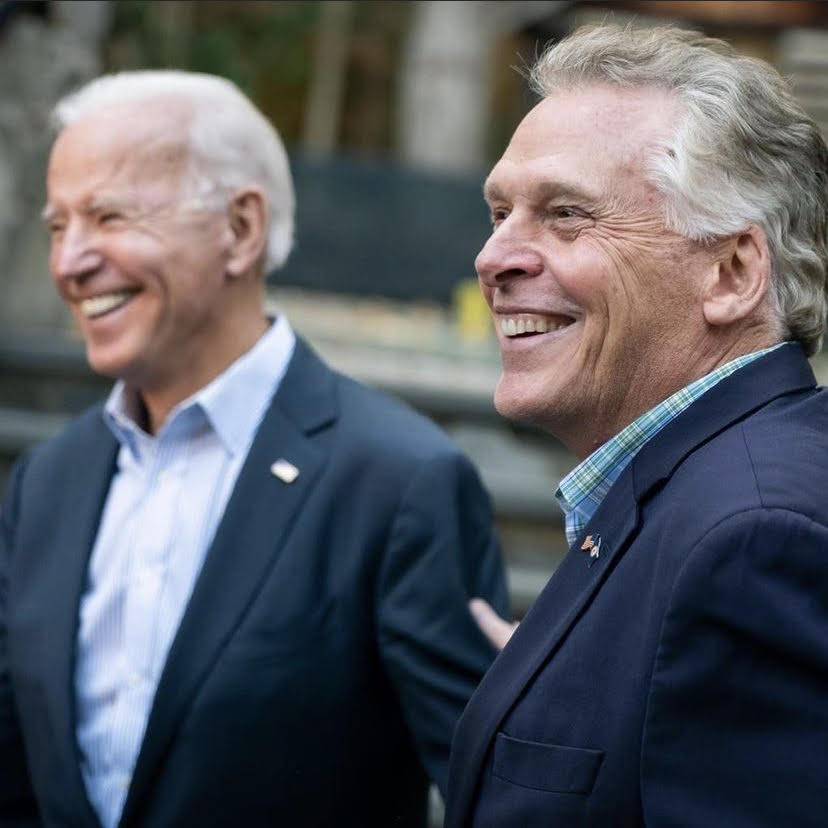Vote for your beliefs, not your party on Nov. 2
4 min read
@terrymcauliffe / Instagram Terry McAuliffe is running for governor of Virginia on the Democratic ticket this Nov. 2.
by KAITLIN SMYTH
Staff Writer
With the Virginia gubernatorial election just around the corner, voters are looking for an experienced leader to move Virginia in the right direction. As voters examine which candidate is right for them, it is important to realize that no candidate is devoid of flaws. Therefore, we must make an educated choice for who we support with our vote.
The overall question among voters this fall is whether they may favor someone who has never run for office, Glenn Youngkin, or favor the former governor of Virginia, Terry McAuliffe, who has years of political experience.
McAuliffe and Youngkin are running a tight race, which has the Democratic Party on the brink of a loss in Virginia. With issues like abortion and COVID-19 being the main foci of their platforms, it is even more important to side not with your political party but with the policies each candidate wants to implement.
Additionally, we students have many resources at our fingertips, so there is no excuse for us not to be educated about our gubernatorial candidates. We must not obscure our judgment with blind faith to our political party when even one or two platforms of the candidate of the opposing party would be more beneficial to our own interests.
As a supporter of McAuliffe’s campaign, President Joe Biden’s decreasing approval ratings due to the withdrawal of troops from Afghanistan and his current leadership regarding the pandemic have influenced McAuliffe’s poll numbers.
When voters see dysfunction in the government, they tend to blame the party in charge and give the candidate of the opposing party a chance as they look for a brand new leader. This is not a useful solution to our problems, and we must instead focus on choosing a candidate who wants to concern themselves with interests of the majority population rather than approval from a certain political party.
With the decline of Biden’s recent approval rates, it would follow that people orient themselves to supporting a Republican candidate. However, many UMW students are leaning more towards McAuliffe.
“I think Terry McAuliffe would be a better fit as governor, which is mainly due to his past term. Youngkin doesn’t sound like he’ll do a good job because a lot of his campaign ads tend to run on the theme of Trump endorsements,” said Bryce Buchanan, a sophomore political science major.
One of the major contending factors trending in voters’ minds is each candidate’s take on abortion.
McAuliffe is against banning abortion, and he has strategized his campaign to defend women’s rights concerning abortion. Additionally, McAuliffe has informed Virginian voters that he will serve as a brick wall against extreme Republican attacks on women’s healthcare rights.
Voters should also take into account the experience each candidate has in order to form their opinion.
Youngkin is a first-time political candidate who worked as the co-CEO of the Carlyle Group for 25 years. He has shown his strength in his ability to raise money, as he was a multi-millionaire who donated frequently to Republican campaigns. He makes it a point to be a businessman, not a politician, as he states in his official Instagram account.
On the other hand, McAuliffe was the Democratic governor of Virginia from 2014 to 2018. McAuliffe was also chairman of the Democratic National Committee from 2001 to 2005, chairman of Hillary Clinton’s 2008 presidential campaign and co-chair of former President Bill Clinton’s 1996 re-election campaign. His expansive political involvement proves his expertise, so those who value political experience, no matter their political affiliation, should value McAuliffe’s history in politics.
During his time as governor, McAuliffe brought 200,000 good paying jobs to the Commonwealth, which drove unemployment rates down. He also raised personal income over 13 percent and invested in workforce development and infrastructure. Additionally, McAuliffe successfully secured a record $1 billion investment in education and expanded preschool to thousands of Virginia children.
Although McAuliffe’s term benefitted the Commonwealth’s economy, his mistakes have to be critiqued as much as his detriments.
“I found Terry McAuliffe’s prior stint in office quite underwhelming. He’s decently progressive, but we just didn’t really see that out of him,” said Isaac Huling, a sophomore philosophy major.
In reference to McAuliffe’s previous position as the chairman for the Democratic National Convention, Huling added, “[McAuliffe] seems to be a good candidate, but he fails to bring the energy to the office that a high ranking executor should have.”
While McAuliffe was governor, he accidentally restored voting rights to several people convicted of violent felonies who were in prison or on supervised probation at the time. Some of these people “were high-profile killers,” according to the Virginia House GOP, which caused major controversies within small communities.
Due to McAuliffe’s mistake, people with criminal records were able to regain access to firearms. Before this order, those with criminal records who wanted to own a firearm had to submit forms that were heavily scrutinized by the Secretary of the Commonwealth’s staff, using the governor’s authority.
However, this time around, McAuliffe has learned from his mistake and has advocated a plan that will treat gun violence as a public health crisis. In doing so, McAuliffe will ban the sale of assault weapons and get high-capacity magazines and ghost guns off of the streets.
As Nov. 2 rolls around, voters must be aware of the impact that COVID-19 still has on their lives, taking into account how each candidate feels about vaccination and mitigation guidelines.
While Youngkin supports getting vaccinated, he argues, “individuals should be allowed to make that decision on their own,” according to CNN.
In contrast, McAuliffe strongly stated his support of vaccine mandates for people working in healthcare, in most education settings and for those pursuing higher education.











